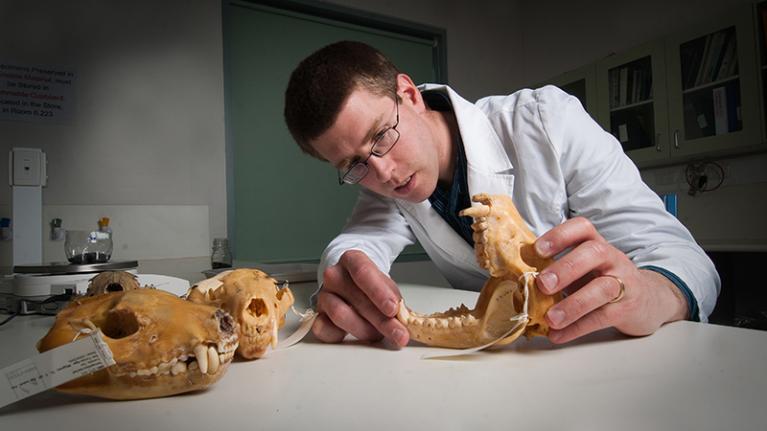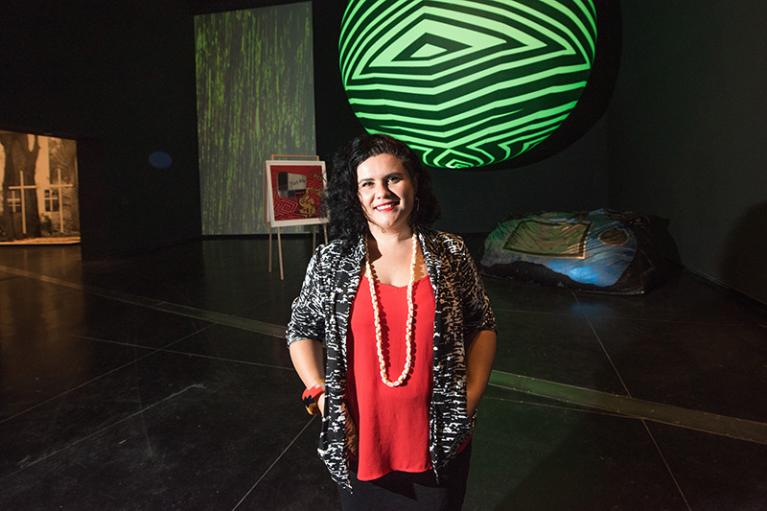Overview
Complete a Master of Research in 18 months in a broad range of disciplines. This program is tailored to graduates with a related bachelor degree, or an honours degree in a different discipline.
During your Master of Research at Victoria University, your study will be individualised according to your academic background. You'll gain crucial skills in research ethics and project design. Then you'll either study further research methods, or a disciplinary component relevant to your research. On passing the units with a 70% average, you’ll begin your own research in a field of personal passion and interest.
For your original thesis, you'll receive expert guidance from leading researchers within our 'Sustainable industries and liveable cities' research group, which includes:
- Institute for Sustainable Industries and Liveable Cities
- Centre of Policy Studies (CoPS)
- Centre for International Research on Education Systems (CIRES).
VU also offers exceptional opportunities for research into Indigenous history and society, in our Moondani Balluk research unit.
In your chosen area of research – as diverse as arts, business, computer science, education, engineering, economics, science, law, and sociology – you'll address important contemporary issues such as:
- climate change
- cultural diversity, arts and social justice
- technology in future industries, education and policy
- urban planning.
Further opportunities exist to complete a Masters of Research in the Institute for Health & Sport.
High research rankings
VU is recognised for research excellence – in the latest Excellence in Research for Australia rankings, we were rated above world standard for our engineering, mathematical sciences, and applied-mathematics areas, among others.
We have also been ranked:
- 2nd in Victoria for computer science
- 3rd in Victoria for engineering & technology (Times Higher Education).
World-class facilities
Engineering & science labs
Victoria University has high-tech laboratories and equipment that enable our innovative research.
These include:
- computer modelling software packages including GIS and REALM
- controlled-temperature rooms for botanical work
- dynamics labs including drop- and shock-testing and thermal-imaging equipment
- e-health software and systems, including PhysAnalyser & GP E-connect
- fluid mechanics and hydraulics lab
- large-scale structural fire-test furnace
- materials engineering labs
- PCR molecular labs
- pluviometers, flowmeters, and water-quality monitoring equipment
- polymer research lab.
Libraries & special collections
The VU Library holds several special collections and archives that are available to assist graduate students and staff in their research.
Partnerships & collaboration
We have working partnerships with most universities in Victoria, and several large industry and government departments.
Our collaborative partners include the following, among many others:
- Attorney-General’s Department
- Australian Federal Police
- Australian Multicultural Foundation
- Australian Social Policy Institute (ASPI)
- Cross Yarra Tunnel
- Defence Science and Technology Group (DST Group)
- Greater Western Water
- GWMWater
- Islamic Council of Victoria (ICV)
- Melbourne City Mission
- Melbourne Metro
- Memcor
- NEXUS Online
- Oztron Energy
- Peter Mac Cancer Centre
- Sunshine Hospital
- Telstra
- The University of Texas El Paso (UTEP)
- United Energy
- World Health Organization (WHO).
Centres & institutes
Our research is aligned with two interdisciplinary flagship research themes, delivered through six research focus areas.
Sustainable industries and liveable cities research is undertaken by:
- Institute for Sustainable Industries and Liveable Cities
- Centre of Policy Studies (CoPS) – economic-modelling research
- Centre for International Research on Education Systems (CIRES).
You can research Indigenous history and society in our Moondani Balluk research unit.
You'll have access to expertise in our collaborative law and policy institutes:
- The Mitchell Institute – health and education policy
- Sir Zelman Cowen Centre – law-related topics for industry, government and the community.
You can also undertake a masters through VU's Institute for Health and Sport.
Research programs
Conduct research that addresses major challenges faced by communities and industries. We offer leading supervision in several areas:
- Cultural Diversity: Migration and mobility; Social inclusion, cohesion and equity; Access to justice; Community services; Creative arts
- Urbanisation – Leading Urban Planning for the West & Beyond: Infrastructure and services; Urban and peri-urban planning; Quality of life
- Climate Change: Impact analysis, mitigation and adaptation; Infrastructure and planning; Risk analysis and management; Decision support
- Industrial Futures Preparing Technology-driven Futures: Technological change; Product innovation; Economic policy; Regulation and governance
- Future of Work: Technological change; Micro, small and medium business; Skill and knowledge development.
Research scholarships
Victoria University has several generous research scholarships available for successful Master of Research students. These scholarships are highly competitive.
There are also externally funded scholarships from dozens of organisations, some of which are aimed at postgraduate students.
Research opportunities & development
VU Research gives you opportunities to:
- connect with other researchers
- participate in research festivals and competitions
- develop your research skills
- get funding for your research
- publish and promote your findings.
We offer support for graduate researchers including:
- an orientation program
- a specialised Graduate Research School
- study spaces within your discipline
- units to help you conceptualise and contextualise your research
- research ambassadors and student association.
Find out more about graduate opportunities at VU.
Study in your chosen discipline
Victoria University offers expert supervision for masters research in these areas:
- Applied Science
- Arts
- Biomedical Sciences
- Biotechnology
- Business
- Chemical Sciences
- Civil and Building Engineering
- Computer Science and Mathematics
- Education
- Electrical Engineering
- Environmental and Risk Engineering
- Food Science
- Law and Justice
- Mechanical Engineering
- Nursing
- Physics
- Sport and Recreation
Some of these disciplines will be better aligned with a Masters of Research in the Institute for Health & Sport.
A Master by Research to match your needs
Victoria University offers Master of Research options to fit your experience and qualifications.
Within our Sustainable Industries and Liveable Cities focus areas, we also offer:
- Master of Applied Research – a two-year, full-time program for graduates of any bachelor program to move into a different discipline.
- Master of Research Practice – a one-year program for students with an honours degree in a relevant discipline.
You can also undertake a Masters of Research or choose from the same suite of research degrees, within our health and sport focus area.
Need some advice?
Request a call back from one of our experienced VUHQ course advisers to get your questions answered.
Request a call back


Careers
A masters degree is increasingly important for a professional career. The Master of Research will ensure you are prepared to enter the competitive job market.
This course could lead to a career as researcher or academic tutor, and prepare you for a senior role in a number of specialist fields.
You'll have the experience and confidence to take a leading position in a range of fields related to your discipline:
- education in schools or other settings
- policy making and development
- public-sector research or writing
- programmer or IT specialist
- scientist.
Course structure
To attain the Master of Research, students will be required to complete the below mentioned components consisting of:
-
Required coursework units with a minimum of an average of 70% or have approved advanced standing for the unit(s)
- A Research Thesis unit and have had their thesis classified as passed by the Dean, Graduate Research (or nominee)
Course structure and units
Core Units
-
- Unit code
- UGR7002
- Credits
- 12
-
- Unit code
- UGR7003
- Credits
- 12
Plus
Students with AQF7 qualification in a cognate discipline
-
- Unit code
- UGR7001
- Credits
- 12
Or
Students with AQF8 qualification in a non-cognate discipline
-
- Unit code
- UGR7006
- Credits
- 12
Thesis Units
-
- Unit code
- UGR8001
- Credits
- 12
Applied Science
-
- Unit code
- SHM8004
Arts
-
- Unit code
- APR8004
Biomedical Sciences
-
- Unit code
- RBM8005
Biotechnology
-
- Unit code
- RBT8004
Business
-
- Unit code
- BMO8014
Chemical Sciences
-
- Unit code
- RCS8004
Civil and Building Engineering
-
- Unit code
- VCC8004
Computer Science and Mathematics
-
- Unit code
- RCM8004
Education
-
- Unit code
- AER8013
Electrical Engineering
-
- Unit code
- VEE8004
Environmental and Risk Engineering
-
- Unit code
- VQT8005
Food Science
-
- Unit code
- RBF8004
Law and Justice
-
- Unit code
- BLO8014
Mechanical Engineering
-
- Unit code
- VMR8004
Nursing
-
- Unit code
- HNM8004
Physics
-
- Unit code
- RPH8004
Sport Science
-
- Unit code
- SSR8004
Learning outcomes
The Master of Research at VU provides students with the opportunity to undertake and complete a research project under supervision at masters level (AQF 9). It will achieve this by providing students with a range of initial coursework units covering a) the nature and expectation of the research process and b) disciplinary specialisations where appropriate. (Please note: students with different entry levels into the MRes program may be eligible for Advanced Standing for particular units. For example, a student with a AQF Level 7 degree in the same discipline in which they will undertake their research degree will gain Advanced Standing for 1 unit of disciplinary studies.) The research progress will also be scaffolded by milestone requirements ensuring support throughout and quality and timely submission of the research.
AQF level 9 criteria: Graduates at this level will have specialised knowledge and skills for research, and/or professional practice and/or further learning and be able to:
Knowledge
- Critically review a body of knowledge that includes the understanding of recent developments in one or more disciplines
- Demonstrate advanced knowledge of research principles and methods applicable to the field of work or learning
Skills
- Conceptually map and critically evaluate theoretical knowledge and to reflect critically on its application to the chosen field
- Develop high level cognitive, technical and creative skills with which to investigate, analyse and synthesise complex information, problems, concepts and theories and to apply established theories to different bodies of knowledge or practice
- Develop high level cognitive, technical and creative skills required to generate, evaluate and synthesise complex ideas and concepts at an abstract level
- Analyse, critique and implement cognitive and technical skills required to design, use and evaluate research and research methods
- Develop effective communication and technical skills required to present a coherent and sustained argument and to disseminate research results to specialist and non-specialist audiences
- Demonstrate expertise in the technical and communication skills required to design, evaluate, implement, analyse, theorise and disseminate research that makes a contribution to knowledge.
Application of Knowledge and Skills
Graduates of a Master of Research will demonstrate the application of knowledge & skills:
- with creativity and initiative to new situations and/or for further learning
- with high level personal autonomy and accountability
- to plan and execute a substantial piece of research
What's a unit?
A unit or 'subject' is the actual class you'll attend in the process of completing a course.
Most courses have a mixture of compulsory 'core' units that you need to take and optional elective units that you can choose to take based on your area of interest, expertise or experience.
Credits
Each unit is worth a set amount of study credits based on the amount of time you study. Generally, 1 credit is equal to 1 hour of study per week.
Admission & pathways
Meeting the minimum admission requirements does not guarantee you entry into this course. Some courses receive more applications than the number of places available. In this situation we will also assess your education, work and other relevant experience.
If you do not meet the minimum requirements you may be eligible for one of our special admission programs. We also encourage you to explore our study pathways to help you reach your goal.
Find out more about how to apply for our courses, and our commitment to admissions transparency.
Entry requirements
Completion of an Australian Bachelor degree (or equivalent) in the same discipline with an average grade of Distinction (or equivalent) in the final year.
OR
Completion of an Australian Bachelor Honours degree (or equivalent) in a different discipline with an average grade of Distinction (or equivalent).
Pathways from VU courses
There are many ways you can start your education journey at VU. Pathways offer an easy transition between courses at different levels, so that you can start with a certificate and progress right through to postgraduate study.
Find out more about pathways and credits.
Credit for skills and past study
Use our credit calculator to find out how much credit you could get towards your course, based on your previous study.
If you have completed study with another university or institution and believe you are eligible to receive credit for skills and past study, you can apply for advanced standing.
Applications for advanced standing can be made after a discussion with your course chair or academic adviser.
How to apply
Available start dates:
- 1 July 2026
Before you apply
Before applying, you should consider whether you also want to apply for:
- Special admission programs: Depending on your life circumstances you may be eligible for special consideration of your application.
- Advanced standing: If you have significant experience or studies elsewhere you may be eligible for credit for some units of your course and not have to undertake them.
Find out more about applying for our courses.
Apply direct to VU
Direct applications are due on 10 May 2026 for our next intake which starts on 1 July 2026.
Already a VU student?
If you are already a VU student, apply direct to VU using our Admissions centre to transfer into this course. Remember it’s best to be accepted into your new course before withdrawing from your current one.
After you apply
- It’s important to check for emails from us (which may go to your spam/junk folder).
- Complete any requests for information by the given dates, otherwise your application may not be considered
You will need to follow the six steps to becoming a research student.
Contact the Office for Researcher Training, Quality & Integrity on +61 3 9919 4522 or email apply.research@vu.edu.au if you require further information.
Enquire now
Please fill out the form below, and we'll get back to you shortly.
Get help
- Visit a student service centre
- 1300 VIC UNI (1300 842 864)
- Request a call back
- Visit the glossary
At Victoria University, we aim to display accurate and complete course information online. However, we are unable to guarantee that every course change is currently displayed. You may contact the University directly on +61 3 9919 6100 to confirm the most up-to-date course fees, pathways and credit transfer, recognition of prior learning, admission and enrolment procedures, examinations and services available to our students.


